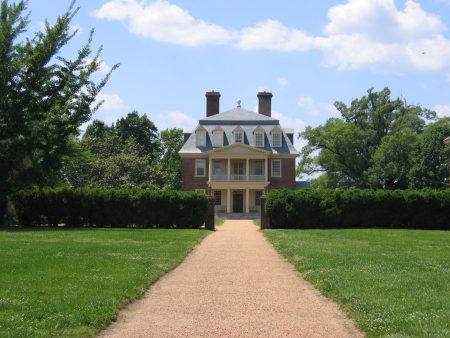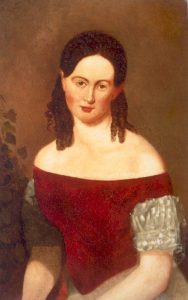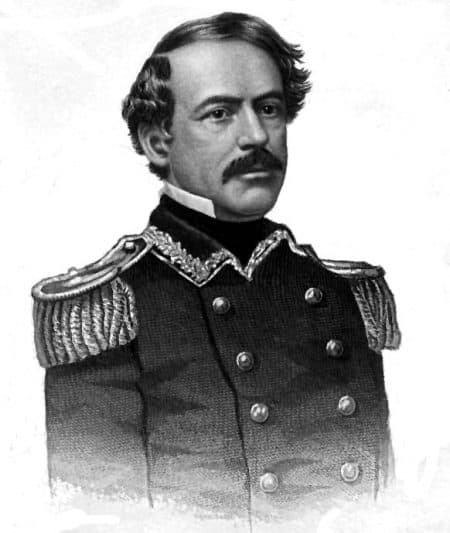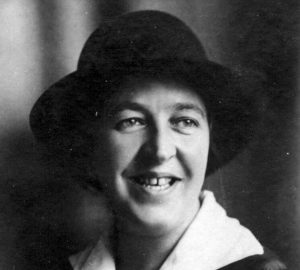
The young mother blinked through her tears as she looked at her new house on Cameron Street in Alexandria, Virginia. For most mothers, the house before her would be a mansion. It was a large and stately brick house. But for Ann, it was a gigantic step downward. She was still a young mother, with children to raise. Her youngest boy was still very little, and he clung wide-eyed to her hand, wondering why his mother was crying.
Ann had been raised in luxury at Shirley Plantation, one of the finest mansions in Virginia. Her father was reputed to be one of the richest men in America. Atop Shirley Plantation was a large wooden pineapple, the signal in colonial Virginia for hospitality. But her girlhood mansion was now only a memory. Poor financial speculations and the turning tide of political opinion had taken their toll on the fortunes of the man she had married.
Ann was a devout Christian lady, and all the finery of her girlhood could not smother the spark of genuine piety in her. As a youth, she was regarded as the most eligible young lady in Virginia. She was regarded by all as young, pretty, and charming. She was descended from the finest family in Virginia, and everyone from George Washington down to the servant boy in Williamsburg knew the family name Carter.

Ann Hill Carter had been married as a teenager to the governor of Virginia, Henry “Light Horse Harry” Lee, a man twice her age. Her husband was a dashing soldier, a war hero, and a man beloved by the best and brightest throughout the entire continent. He was devoted to her. He did his best to keep a happy home in spite of his busy life as the most prominent magistrate of the Old Dominion.
But life has its hardships, even for the rich and famous. Land speculation had turned sour. Ann’s husband, always an optimist, had invested money in a venture on the falls of the Potomac along with men as admirable as George Washington. Now, that investment had fallen through, and the money was all gone. Other investments had failed to turn around their financial situation. As God’s Providence would have it, her husband’s political party was on the decline. George Washington was dead. The Federalists were losing the political power they had once enjoyed.
Ann’s kind father, Mr. Charles Carter, had done what he could, and he had kindly set up a trust fund that would care for his daughter and his grandchildren. Ann’s husband could no longer assist her in raising the family. He had been severely injured when a mob had rioted against his political party and he was away from his family, trying to regain his health on a Caribbean voyage his doctor had urged.
Ann was now left alone with her children. She had been sick and heartbroken when God had given her this young boy who now clung to her hand. In fact, in bearing this child, Ann lost so much strength, that before many more years would pass, she would be an invalid.
Ann was still young, and all the hardships of life could not efface the graceful bearing and noble charm of this Virginia dame, but her wealth, her estate, her jewels, her reputation, her husband’s honor, all were gone.
Again, tears welled up in her eyes as she looked upon the small children that were under her care. Would they be provided for? Would her children wander in this world as orphans, without a father, without a home, without any trace of their family heritage? Would their family name be forever held in dishonor? Then Ann remembered a verse from her Bible, a beautiful Bible that had been given her as a little girl on her happy and prosperous estate, “A good name is rather to be chosen than great riches, and loving favour rather than silver and gold” (Proverbs 22:1). As Ann pondered this verse, she realized that the greatest treasure she had was her children. God had given her children, and although she could no longer offer them a fine estate, or a splendid reputation, she could give them Godly character that would preserve the family name. She could train them to emulate the best virtues of the Word of God.
The years rolled by for Ann and her family. More sorrows were still in the future. When the youngest lad was only seven years old, Ann’s husband died while he was still at sea. Ann was left a widow, but what she had vowed to do, she did.
Ann’s youngest son, many years later, would look back with many fond memories upon the home his mother had made for him. She taught him character. She taught him to love God and to serve Him in sincerity and in truth. She taught him to be a man of honor, a man of his word, and to avoid the kind of speculation and debt that had brought their family such disgrace. This young son did go on to live as his mother had taught him. As her sickness increased over the years, she leaned more and more upon this boy. As he matured, many times he would lay aside opportunities to play with his friends so that he could help take care of “Mother.” He took her on rides in the country. He helped her with chores around the house. He helped to make her as comfortable and happy as circumstances would permit. Ann would one day say of this boy, “He was both son and daughter to me.” This son honored his mother for the rest of his life. He knew that she was the one that formed his character, that taught him to love and serve the Lord, and molded him into the man that he became. Robert E. Lee once said that he “owed everything” to his mother, Ann Hill Carter Lee.
Born into the lap of luxury at the magnificent Shirley Plantation of the Carter family, Ann knew the heights of joy. She also knew the depths of sadness when her husband lost his estate at Stratford Hall and had to send his family to live in Alexandria. But Ann found that her greatest treasure was the eternal souls of her children.
The name of Ann Hill Carter Lee will forever be venerated by all Christians who love what is best in a wife and mother. Her gold and jewels are all forgotten. Her youthful beauty eventually faded and the flush of youthful glamour was replaced by the mature lines of elderly grace. Her girlhood home is now a museum piece, a relic of Virginia’s distant past. But everyone knows the name of Robert E. Lee, her son, and his enduring legacy continues to inspire every succeeding generation.

Bibliography
R. E. Lee by Douglas Southall Freeman
Life and Letters of Robert E. Lee by J. William Jones
Recollections and Letters of Robert E. Lee by Captain Robert E. Lee Jr.




